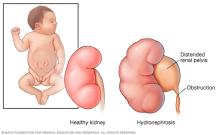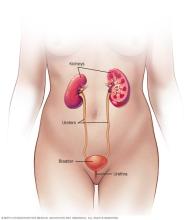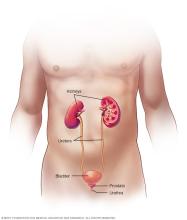Hydronephrosis
Conditions
Overview

Hydronephrosis is swelling of one or both kidneys. It happens when urine can't drain from a kidney and builds up in the kidney as a result. The condition can be due to a blockage in the tubes that drain urine from the kidneys. It also can happen due to a difference present at birth that prevents urine from draining properly. In some people, hydronephrosis causes kidney damage over time.
Hydronephrosis can happen at any age. The condition often causes no symptoms. People who get symptoms may have side and back pain, painful urination, vomiting and fever. Healthcare professionals have various ways to spot hydronephrosis. Tests to find the condition can be done during infancy or sometimes before a baby is born.
Treatment for hydronephrosis depends on the condition's cause. Some people need medicine or surgery to feel better and prevent kidney damage. Mild hydronephrosis sometimes goes away on its own over time.
Symptoms
Hydronephrosis often causes no symptoms. But when symptoms happen, they can include:
- Pain in the side and back that may travel to the lower stomach area or groin.
- Pain with urination, or feeling a need to urinate that is urgent or happens often.
- Upset stomach and vomiting.
- Fever.
- Failure to thrive in infants.
- Weight loss or loss of appetite.
- Blood in urine.
When to see a doctor
Call your healthcare professional if you have any symptoms of hydronephrosis. Babies with the condition often don't have symptoms. But get your baby a healthcare checkup right away for symptoms such as high fever.
Causes


Causes of hydronephrosis include a blockage or other health issue that affects the urinary tract. The urinary tract includes the kidneys and the bladder. Urine flows from the kidneys to the bladder through tubes called ureters. Urine leaves the bladder and the body through another tube called the urethra.
A partly or fully blocked urinary tract can keep urine from leaving the kidneys and cause swelling. Other issues that disrupt the urinary tract can cause urine to flow backward through the ureters from the bladder up into the kidneys. When urine flows the wrong way, the condition is called vesicoureteral reflux.
Causes of hydronephrosis include the following:
Conditions present at birth. Some babies are born with a partial kidney blockage called a ureteropelvic junction obstruction. Most often, the blockage forms where a kidney attaches to one of the tubes that carry urine to the bladder. These tubes are called the ureters.
Other babies are born with a ureter that isn't typical in structure. Urine flows backward through the ureter from the bladder up into the kidney as a result. When backward urine flow happens, it's known as vesicoureteral reflux.
- Kidney stones. These are hard buildups of minerals and salts that form inside the kidneys.
- Enlarged prostate. A very enlarged prostate can cause the bladder to have trouble emptying urine. Urine may back up into the kidneys as a result.
- Injured or narrowed ureter. Pelvic surgery done with cuts through the stomach area could injure a ureter by accident. A ureter could become narrowed for reasons such as scarring after surgery or having radiation therapy for prostate cancer.
- Urinary tract infection. This type of infection can inflame any part of the urinary tract, including the kidneys.
- Pregnancy. Swelling of the kidneys' urine drainage system is common during pregnancy. Often, hydronephrosis in pregnant people doesn't cause symptoms and goes away after giving birth.
- Cancer. With some types of cancer, a tumor can cause a urinary tract blockage. These include cancers of the bladder, cervix, colon and prostate.
Risk factors
Hydronephrosis risk factors among adults ages 20 to 60 include being born female. The higher risk could be due to certain conditions that affect the uterus, such as pregnancy. It also could be due to conditions that affect the ovaries, such as cysts, buildups of pus and cancer. Risk factors for people older than age 60 include having an enlarged prostate or a urinary tract blockage from cancer.
Complications
Hydronephrosis can lead to other health conditions called complications. Without treatment, some people who have severe hydronephrosis develop lasting kidney damage. Rarely, the condition can cause an affected kidney to lose its ability to filter blood, also called kidney failure.
Diagnosis
Diagnosis involves the steps that your healthcare team takes to find out if hydronephrosis is the cause of your symptoms. Your healthcare professional starts by asking you about your symptoms and doing a physical exam. You may be referred to a doctor called a urologist, who finds and treats conditions of the urinary system.
Tests that can help find out if you have hydronephrosis can include:
- A blood test to check how well the kidneys work.
- A urine test to look for clues that infection or kidney stones may be causing a blockage.
- An ultrasound imaging exam to view the kidneys, bladder and other parts of the urinary tract. This test can help spot possible health conditions.
- An X-ray exam of the urinary tract that uses a special dye to outline the kidneys, ureters, bladder and urethra. This test is called a CT urogram. It captures images of the urinary tract before and after urination.
Your healthcare professional also may suggest another imaging exam, such as an MRI. Another testing option called a MAG3 scan checks kidney function and drainage.
During pregnancy, a routine ultrasound test often spots hydronephrosis in unborn babies.
Treatment
Treatment for hydronephrosis depends on its cause and how bad the symptoms are. The goal of treatment is to ease kidney swelling and prevent kidney damage. You may need medicine, a process to drain urine or surgery. In some people, mild hydronephrosis goes away on its own in time.
Medications
Your healthcare professional may prescribe medicine to ease pain. Some people need medicine called antibiotics to clear up a urinary tract infection. Sometimes, babies with hydronephrosis are given antibiotics to prevent infections. Babies often don't need other treatment. They often have mild hydronephrosis that gets better on its own. Imaging tests can track their health over time.
Surgery or other procedures
Sometimes, surgery is needed to fix a blockage or correct the backward flow of urine. Surgery also may be done to ease terrible pain or vomiting from hydronephrosis.
Surgery may be a treatment option for hydronephrosis caused by conditions such as:
- Kidney stones.
- Enlarged prostate.
- Blocked or narrowed ureter.
- Cancer.
Some people also need to have excess urine drained from the body. A healthcare professional does this by placing a thin tube called a catheter into the bladder.
Early treatment for hydronephrosis helps many people get better. It also helps prevent lasting kidney damage.
Preparing for an appointment
You may start by seeing your main healthcare professional. Or you might be referred to a doctor called a urologist who finds and treats urinary tract conditions.
Here's some information to help you get ready for your appointment.
What you can do
When you make the appointment, ask if there's anything you need to do in advance. For instance, you may need to stop eating for a certain number of hours before a test. Also, it helps to make a list of:
- Your symptoms, including any that don't seem related to the reason for your appointment.
- Key personal information, including major stresses, recent life changes and family medical history.
- All medicines, vitamins and other supplements you take, including the doses.
- Questions to ask your healthcare professional.
Take a family member or friend along if you can. This person can help you remember the information you're given.
For hydronephrosis, some basic questions to ask your healthcare professional include:
- What's likely causing my symptoms? Are there other possible causes?
- What tests do I need?
- Is my condition likely short-term or long lasting?
- What treatment is right for me? Are there other treatment choices as well?
- I have other health conditions. How can I best manage them together?
- Are there restrictions I need to follow?
- Should I see a specialist?
- Are there brochures or other printed material I can have? What websites do you recommend?
Feel free to ask other questions.
What to expect from your doctor
Your healthcare professional is likely to ask you questions such as:
- When did your symptoms start?
- Do your symptoms happen some of the time or all of the time?
- How bad are your symptoms?
- What, if anything, seems to make your symptoms better?
- What, if anything, appears to make your symptoms worse?
© 1998-2026 Mayo Foundation for Medical Education and Research(MFMER). All rights reserved. Terms of Use
